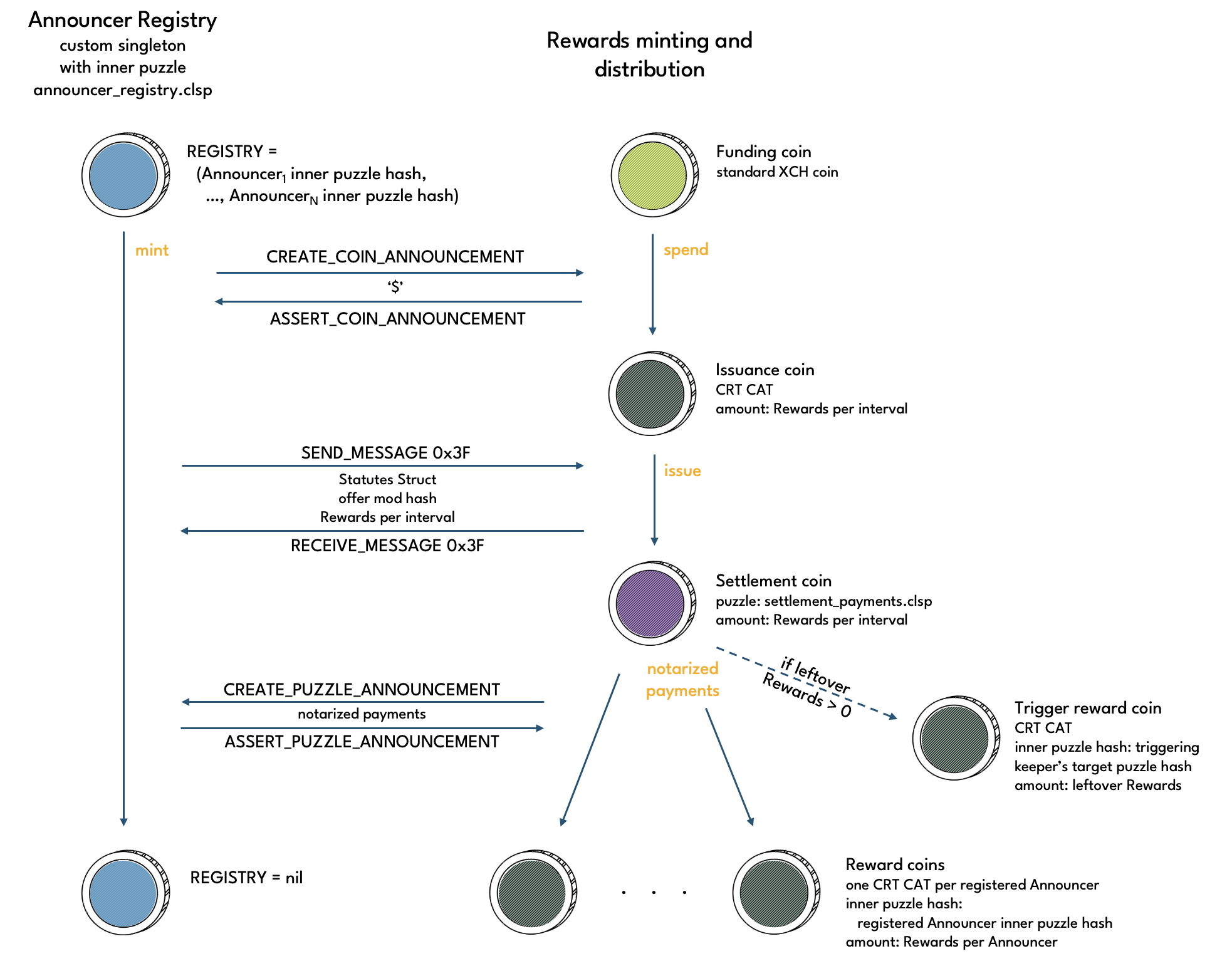Announcer Registry
The Announcer Registry, or Registry for short, is a custom singleton that approved Announcers can register with. Registered Announcers can periodically claim Rewards from the Registry, which are paid in the form of newly issue CRT tokens. Rewards are intended to compensate data providers for the costs they incur by running an Announcer that publishes up-to-date price information.
Rewards accrue with every Statutes Price update and become claimable once the number of updates since the previous Reward distribution exceeds Rewards Interval.
Any Rewards claim automatically distributes CRT tokens to all registered Announcers, not just the keeper executing the operation. When Rewards are distributed, the Registry is cleared and all Announcers are required to re-register to continue to be eligible for Rewards.
Data providers must re-register their Announcers every time Rewards are distributed to remain eligible for future Rewards.
Operations
Puzzle that operations are performed on: announcer_registry.clsp
Protocol deployer operations:
- launch: eve spend that must be executed at protocol launch - puzzle: announcer_registry.clsp
Announcer operations:
- register: adds a governance-approved Announcer to the Registry - puzzle: announcer_registry.clsp
Keeper operations:
- reward: distributes Rewards - puzzle: announcer_registry.clsp
Although the Registry is not owned by anyone, the register operation can only be performed by data providers that control an approved Announcer.
Launch
The Announcer Registry must be launched as part of the protocol launch process. As such, the launch operation is only performed once and irrelevant to protocol users and keepers.
Register
The owner of an Announcer that has been approved by governance can register the Announcer with the Announcer Registry. A registered Announcer receives Rewards the next time Rewards are distributed. All registered Announcers receive the same amount of Rewards, irrespective of when they were registered. Announcers need to re-register after Rewards are distributed in order to be eligible for the next Reward distribution.
Announcers are registered by prepending a target puzzle hash to the ANNOUNCER_REGISTRY list. The target puzzle hash is where the Announcer would like to receive their Rewards. The target puzzle hash can, but need not be, the Announcer's inner puzzle hash. Using a different target puzzle hash allows data providers to separate private key management for the Announcer from custody arrangements used for Rewards.
State changes
ANNOUNCER_REGISTRY: target puzzle hash of Announcer getting registered gets prepended
Reward
The reward operation is used to distribute Rewards to registered Announcers. Although the operation can be performed by anyone, in practice data providers that control a registered Announcer have the strongest incentive to do so.
When Rewards are distributed, the Registry is cleared, i.e. ANNOUNCER_REGISTRY is set to nil. This means that Announcers must be re-registered in order to receive Rewards during the next distribution. It is sufficient to re-register at any time before Price Update Counter exceeds REWARDS_CLAIMABLE_AT, which is the earliest point in time when the reward operation can be performed next. This gives data providers flexibility to re-register when transaction fees are low.
A slight disadvantage is that if Rewards aren't distributed at the earliest possible opportunity, i.e. when Price Update Counter = REWARDS_CLAIMABLE_AT + 1, for example because transaction fees are high, then there is no corresponding increase in Rewards for additional Price Update Counter increases.

The amount of mCRT paid to each registered Announcer during a Rewards distribution is Rewards per Interval divided by the number of registered Announcers rounded down to the nearest integer. Any remainder can be claimed by the keeper performing the operation by providing a puzzle hash.
The rate at which CRT rewards can accrue is capped by the Maximum Reward per Interval divided by the Minimum Reward Interval. Both parameters are fixed args of the Registry mod that are set at protocol launch and can never be changed. This caps the annual CRT supply growth from rewarding Announcers in perpetuity, giving CRT holders a guarantee on the maximum dilution they may suffer.
(mod (MAXIMUM_REWARD_PER_INTERVAL MINIMUM_REWARD_INTERVAL ... MOD_HASH ...) ...)
Distributing Rewards increases the CRT supply.
State changes
ANNOUNCER_REGISTRY: gets cleared, i.e. set to nil.CLAIM_COUNTER: gets increased by 1REWARDS_CLAIMABLE_AT: gets updated to Price Update Counter plus Reward Interval.
State and lineage
Fixed state:
MAXIMUM_REWARD_PER_INTERVALMINIMUM_REWARD_INTERVALATOM_ANNOUNCER_MOD_HASHCAT_MOD_HASHCRT_TAIL_MOD_HASHRUN_TAIL_MOD_HASHOFFER_MOD_HASH
Immutable state:
MOD_HASHSTATUTES_STRUCT
Mutable state:
ANNOUNCER_REGISTRY: List of puzzle hashes at which registered Announcers receive RewardsREWARDS_CLAIMABLE_AT: Number of Statutes price updates after which Rewards can be distributed next
Eve state
The eve state of the Registry may come without registered Announcers or with a number of pre-registered Announcers. In the former case, the ANNOUNCER_REGISTRY curried arg would be set to nil, in the latter case it would be a list of target puzzle hashes of pre-registered Announcers.
Amount
The Announcer Registry coin amount is always 0.
Lineage
Being a custom singleton, the Announcer Registry requires a lineage proof when spent. In case of the eve spend, which must be performed using the launch operation, the Registry asserts the standard launcher CREATE_COIN_ANNOUNCEMENT from the Statutes launcher coin. This requires the lineage proof to be the treehash of a list consisting of the Statutes eve puzzle hash (corresponding to the full puzlle including the outer standard singleton layer) and the amount of the Statutes eve coin, which is always 1 . It also means that the Registry's eve spend must occur at protocol launch.
Statutes
- Reward per Interval
- Statute index: 29
- Statute name: STATUTE_ANNOUNCER_CRT_CREDITS_PER_INTERVAL
- considerations:
- Reward Interval
- Statute index: 30
- Statute name:STATUTE_ANNOUNCER_CREDITS_INTERVAL
- considerations: